- Home
- Parnell Hall
A Clue for the Puzzle Lady Page 2
A Clue for the Puzzle Lady Read online
Page 2
The stores on Main Street also tended to be of the more genteel variety, such as the pharmacy and the bake shop. Anything as blatantly commercial as the laundromat or the pizza parlor was carefully tucked away down one of the side streets, and gas stations and supermarkets were banished to the outskirts of town.
The houses looked remarkably similar. On the three blocks of Main Street that were considered downtown, most were white with black shutters, though some were white with green shutters, and one was actually pale yellow.
Many of the stores were antique shops, enough so that the sign Antiquers Crossing would have adorned a crosswalk, had it not been narrowly voted down by the selectmen.
The police station was white with black shutters, and not only could have passed for an antique shop, it had, in fact, once been one. Jackson Dooley, an elderly antiquer who had outlived his family and died without heirs, had left the building to the town with the provision that it be used by the police. Jackson Dooley felt beholden to the Bakerhaven police for coming to his aid at the time of a burglary. This was somewhat magnanimous on his part, for cracking the case had not been hard. Mr. Dooley, who happened to know the burglar, had been able to tell the police the thief’s address. It had remained for them to drive out to the man’s house and arrest him.
Chief Harper pulled up in front of the police station, which was located just across from the library and down the street from Cushman’s Bake Shop. Judging from the number of cars parked outside, Cushman’s was doing a brisk business in spite of the rain, and in spite of the fact that the proprietor, Mary Cushman, couldn’t bake a lick—it was common knowledge her pastries were trucked in every morning from New York City.
Chief Harper was tempted to stop in for a muffin—after all, he’d missed breakfast. But people would want to know why he was there. That was the trouble with living in a small town. Everyone knew he ate breakfast at home. Not that that was big news, but he was the police chief, and everyone knew what he did. If he showed up at the bake shop, people would want to know why. And he didn’t want to tell them.
Chief Harper killed the motor. He got out of the car, dashed up the two steps to the police station, and pushed open the door.
Dan Finley was at his desk. The young, eager officer who’d called him away from breakfast sprang up when he came in. “Did you see her? Is it true?”
Chief Harper hung his wet slicker on a hook and wiped his forehead on his sleeve. “Yeah, it’s true. A young girl’s dead. Barney Nathan’s cutting her up now.”
“Who is it?”
“I don’t know. That’s the first order of business. Grab a camera, get over to the doc’s, get a picture. Then get copies made. We’ll have to circulate ’em. Try to get an ID.”
“She didn’t have one?”
“None at all.”
“Anything give us a hint? Like a letter sweater? Some indication where she went to school?”
“No.”
Chief Harper grabbed a hand towel from the bathroom, dried his hair.
“What does the doc say?”
“Says she’s dead. Acts like he’s doing us a favor just telling us that much.”
“And that’s it?”
“That’s it. She looked to me like she might have been hit over the head, but then I’m not a doctor.”
“Any chance it was accidental?”
“Not much. If it was an accident, what was she doing there? And where were her shoes?”
“Shoes?”
“The girl was barefoot. She was wearing jeans and a shirt, but no shoes or socks. Who’s going to go running around a cemetery at night with no shoes or socks?”
“Any witnesses?”
Chief Harper shook his head. “We’ll have to canvass for them. Not that I expect much. You call Sam?”
“He’s on his way. Or at least he will be. I woke him up.”
“Good. We’re gonna need him.”
“We got anything to go on? Anything at all?”
Chief Harper frowned. “Actually, yes. But it doesn’t help.”
“What’s that?”
“Glad you reminded me.” Chief Harper reached in his pants pocket and pulled out the folded paper. Luckily, it was still relatively dry.
“What’s that?” Dan Finley said.
“This was in her pocket. Aside from a little cash, it was the only thing on her. I was hoping for a lead. Instead I get this.”
Dan Finley unfolded the paper. Read, “Four d line five?”
“Yeah. Great, huh?”
“What do you think it means?”
“I have no idea.”
“Oh, yeah?” Dan Finley said. “Well, you know what it looks like to me?”
“What’s that?”
Dan Finley’s eyes were shining. He had freckles and sandy hair, and when his eyes lit up, it enhanced his boyish quality. “It looks like a crossword puzzle clue.”
Chief Harper frowned. “How do you get that?”
“Easy. Four d stands for four down. That’s the number of the clue.”
“The number of the clue?”
“Don’t you do crossword puzzles? That’s how clues are numbered. Four down. Twelve across. Twenty-eight down. The number and the direction.”
“So what’s line five?”
“I don’t know. Either four down intersects with line five, or the clue is line five.”
“How could the clue be line five?”
“I don’t know. Why don’t you ask the woman on TV?”
“What?”
“You know. The woman in the ad. ‘A good breakfast cereal is no puzzle. Take it from the Puzzle Lady.’ You must have seen the ad.”
“I’ve seen it. So?”
“She’s here in town. Didn’t you know that?”
“Oh, I suppose,” Chief Harper said. He vaguely recalled his wife or daughter saying something to that effect.
“Yeah, well that’s what I heard. Mickey Hempsted’s wife, Sarah, saw her at the Country Kitchen playing bridge. You can’t miss that face. Anyway, she’d be the one to ask.”
“What’s her name?”
“I don’t know, but it will be in the paper.”
“Huh?”
“She’s got a column in the morning paper. Crossword puzzle column. Every day.” Dan gestured to the newspaper on his desk. “Want me to look it up?”
“No, I want you to get over to the doc’s, get to work on that ID. We’re not going to get anywhere till we know who she was.”
“Right. Now where did I see that camera …”
Dan rummaged through the drawers of his desk, came up with a Polaroid camera.
“I better check the battery and the film. Smile, Chief.”
Before Chief Harper could protest, Dan raised the camera and the flash went off in his face.
“Seems to be working,” Dan said. He pulled the picture from the camera, tossed it on his desk. “In about a minute you’ll have yourself a nice picture. I’ll go shoot the girl.”
“Don’t get the camera wet,” Chief Harper said, but Dan had grabbed his slicker and was already out the door.
Chief Harper finished drying himself, and returned the towel to the bathroom. Hanging it on the rack, he happened to glance in the mirror. He frowned. The man looking back at him wasn’t young, but he wasn’t old either. The curly brown hair was not that gray, not that thin. Of course it always looked darker when it was wet. And, it occurred to him, he was old enough to notice that it was darker.
He looked at himself and sighed. Was this the face of a man about to embark on his first murder case? Yes, he told himself. It was a broad, solid, rugged face. At least he looked competent.
Chief Harper came out of the bathroom. The Polaroid picture Dan Finley had taken was lying on his desk. Harper sat at Dan’s desk, picked up the picture and pulled off the negative.
So much for competent. His eyes were wide, his mouth was open, his head was tilted to one side, and his hand was up as if to ward off a blow.
; He looked like a buffoon.
Yeah, that was more like it.
Chief Harper tossed the photo down on the desk, leaned back in the chair, and rubbed his head.
The phone rang. He scooped it up. “Bakerhaven police. Harper here.”
“Dale. What’s this about a murder?”
Chief Harper groaned. Henry Firth had heard about it already. The county prosecutor had opposed his hiring, had even gone before the selectmen to lobby against him.
Henry Firth would be eager to see him fail.
“A girl was found dead in the cemetery. So far that’s all we know.”
“What are you doing about it?”
“We ’re investigating it.”
“I’m aware of that. How are you investigating it?”
“Barney’s doing an autopsy now. We’ll know more when we get the results. Right now we’re trying to ID her and canvass for witnesses.”
“That’s not enough.”
“I beg your pardon?”
“This is serious, Dale. This is a murder. It has to be solved.”
“No kidding.”
“I’ll be right over. See what you’ve got.”
“I won’t be here. I’m going out.”
“Out? Where?”
“To investigate a murder,” Chief Harper replied, and hung up the phone.
Chief Harper put his head in his hands. He inhaled, exhaled twice. He felt as if the world were closing in on him. Okay, he had to go out. Investigate a murder. Go do something. Anything was better than dealing with Henry Firth.
His eyes lit on the newspaper. He picked it up and flipped through, looking for the crossword column.
It wasn’t hard to find in a paper the size of the Bakerhaven Gazette. In less than a minute Chief Harper was looking at what was unmistakably the column of the woman he’d seen on TV.
The column was headlined: THE PUZZLE LADY. Underneath was a picture of a rather robust, elderly woman, with curly white hair, steel-rimmed spectacles, twinkling eyes, rosy cheeks, and a smile that was just a little bit enigmatic and a little bit smug.
Under the picture was the name Miss Cora Felton.
The puzzle was your standard crossword puzzle. If Chief Harper had counted, he would have found it to be a fifteen-by-fifteen square. He merely registered the fact it was exactly what he had expected.
Except for the theme.
The puzzle was entitled Lost Her Knitting. In addition to the puzzle, there was a short anecdote that preceded it. The anecdote was about a woman who had lost her knitting. Chief Harper read it, failed to see the point.
Oh well, at least he had the woman’s name.
He sighed, reached for the phone.
3
Before the phone rang, Sherry Carter was actually in a pretty good mood. She sat at the kitchen table, sipping her coffee and reading the crossword puzzle, and feeling quite content.
The move to Connecticut had worked out well. Sherry and her aunt had been able to find a modest but comfortable house at a rent that they could afford, living together wasn’t all that bad, and they hadn’t been there long enough to start going stir-crazy yet. In fact, they were only half unpacked, and were still living out of boxes. But Sherry didn’t mind. Setting up her computer and modem had been enough to keep her happy.
She had also gotten a job. Sherry had answered an ad in the local paper for a substitute nursery school teacher. She had no experience, but it was a private school so no teaching certificate was required. And the kids loved her. When she went for the interview, the children wouldn’t leave her alone. The woman who ran the school had hired her on the spot. So far she’d substituted twice, with great success.
Of course it wasn’t steady work, but Sherry already had a job. She was working at it, when the phone rang.
Sherry Carter was proofreading the Puzzle Lady column before faxing it off to the 256 newspapers that carried it nationwide. It was a job she’d done for nearly two years, ever since the very first column.
At the moment, Sherry Carter was checking one of the four long clues. There were two horizontal and two vertical, all of them ten letters each. Sherry was checking 16 across. The answer was sweepstake. The clue was TV month opposite give. The TV month was sweeps month and opposite give was take.
It was, all things considered, a relatively easy clue. But then the Puzzle Lady’s puzzles had not become widely popular by being difficult to solve. The puzzles were comfortably accessible enough to be enjoyed by the masses, while just challenging enough to be fun. TV month opposite give would do nicely. Though, it occurred to her, the Puzzle Lady would get letters from purists pointing out that sweepstakes should be plural.
Sherry Carter smiled. She leaned back in her chair, took a sip of coffee, felt at peace with the world.
The phone rang.
Sherry reached for it eagerly, hoping it was the nursery school asking her to come in. It was a little late for them to be calling, but there was still a chance.
“Hello?”
But there was no one there. Just the crackling open line. A moment later there was a click and then she got a dial tone.
Sherry hung up the phone and her smile faded.
The same thing had happened the night before. If it happened again she’d have to report it. Sherry wondered how long it would take to get repair service in a small town like this.
If it was a malfunction.
If it wasn’t Dennis.
Sherry shuddered, instinctively rubbed her sore ribs, courtesy of her abusive ex-husband’s last little visit. He’d ambushed her outside her apartment, been waiting behind a parked car. She’d known at once she was in trouble. His long, blond hair was matted and snarled, his leather jacket was torn, and there was a red welt on his chin. The typical pattern, par for the course. Having lost a fight at the pub, Dennis would redeem his manhood by winning one at home. But for once she got lucky. A passerby had called the police and a patrol car had gotten there before he could do much damage.
The bruises were almost gone.
It couldn’t be him.
Could it?
Sherry told herself, no, rationally there was no way Dennis could know that she was here. The house and phone were not in her name; even if he knew what town she was in—which he didn’t—there was no way he could get the number. It was a glitch in the phone line, plain and simple, happened all the time, and whoever it was would just call back.
She no sooner had that thought when the phone rang again. Only it didn’t reassure her. Quite the opposite. What if it was Dennis?
That was a frightening enough prospect that Sherry was tempted to let the answering machine pick up. She told herself she was being silly, reached for the phone. In spite of herself, she expected to hear his voice.
But it wasn’t for her.
“Cora Felton?”
Sherry heaved a sigh of relief. She hoped it wasn’t audible over the phone. “Who’s calling, please?”
“Is this the Puzzle Lady?”
“This is Sherry Carter. I’m Cora Felton’s niece. May I help you?”
“No, I need to speak to her. Is she there?”
“I’m afraid she’s sleeping, can I take a message?”
“Sleeping?”
“She works late. Can I take a message?”
“No, I’ll come out. You live at 385 Cold Springs Road?”
“I beg your pardon?”
“Wake her up. I’ll be right there.”
“You most certainly will not. Leave us alone, or I’ll call the police.”
“I am the police.”
“What?”
“Sorry. I should have made that clear. I’m Dale Harper, I’m the Bakerhaven chief of police. I need to speak to Miss Felton. It’s a police matter. I’ll be right over. Please wake her up.”
Sherry Carter hung up the phone in mounting dread. The police? Cora was wanted by the police? What in the world had that woman done now?
Sherry rushed to the front window, look
ed out. The sky was dark and the rain was falling, but she could see the driveway clearly. The car was there, and, while it was parked across the driveway at something of an angle, it did not appear to be scratched. Her worst fears were groundless. So what was this all about?
Sherry hurried to the back hall. Pushed open the door on the right.
And there she was, sleeping soundly, the trademark enigmatic smile on her face, just as if nothing had happened.
Sherry grabbed her arm, shook her. “Aunt Cora!”
Cora Felton stirred, groaned, rolled over on her side, opened a bleary red eye. The odor of stale gin wafted up from the bed.
“Wake up, damn it!” Sherry said. “We’ve got trouble.”
4
“Ow! Too hot!”
“Hold still.”
“You’re burning me.”
“Aunt Cora.”
“What’s this thing on my head?”
“Leave that on.”
“What is it?”
“A shower cap. Your hair has to be dry.”
“Why?”
“Hold still.”
In desperation Sherry Carter was trying to wake Cora Felton up by holding her under the shower. It was only half working. Cora was conscious but barely coherent. She was also rather heavy, and Sherry was having a hard time holding her up.
“Stop squirming.”
“I’m not squirming.”
“You’re not helping. Aunt Cora, what did you do last night?”
“Do?”
“Yes, what did you do?”
“Didn’t do anything.”
“Then why do the police want you?”
“The police?”
“Yes. Why do the police want you?”
“Can’t remember.”
“You can’t remember why the police want you?”
“No. Can you?”
“Aunt Cora—”
“Oh, that’s too cold!”
“Aunt Cora. Did you have a run-in with the police last night?”
Cora sagged against Sherry’s arm. “You know, someone was just asking me that.”

 Clicker Training
Clicker Training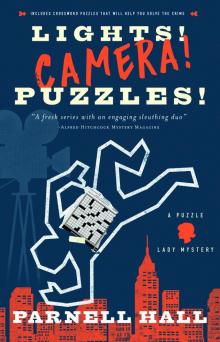 Lights! Camera! Puzzles!
Lights! Camera! Puzzles!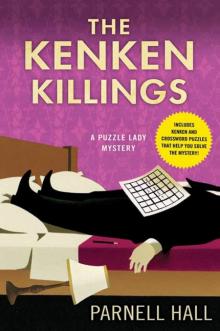 The KenKen Killings
The KenKen Killings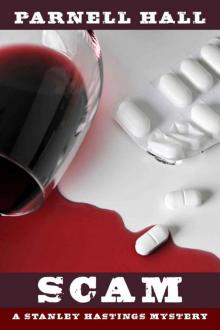 12-Scam
12-Scam The Puzzle Lady vs. the Sudoku Lady
The Puzzle Lady vs. the Sudoku Lady 2 Murder
2 Murder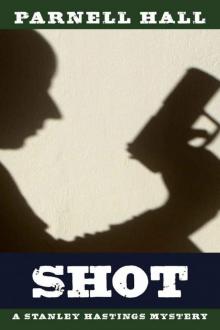 7 Shot
7 Shot You Have the Right to Remain Puzzled
You Have the Right to Remain Puzzled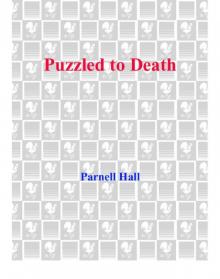 Puzzled to Death
Puzzled to Death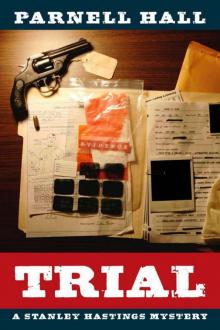 11-Trial
11-Trial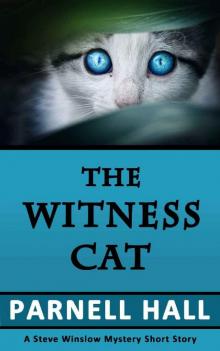 The Witness Cat (Steve Winslow Mystery)
The Witness Cat (Steve Winslow Mystery) With This Puzzle, I Thee Kill
With This Puzzle, I Thee Kill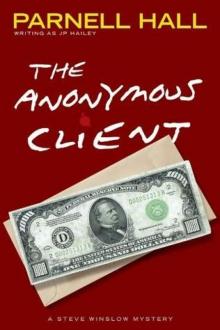 The Anonymous Client sw-2
The Anonymous Client sw-2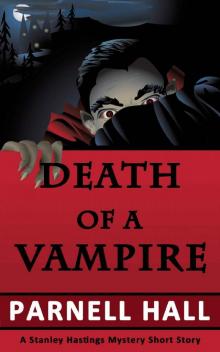 Death of a Vampire (Stanley Hastings Mystery, A Short Story)
Death of a Vampire (Stanley Hastings Mystery, A Short Story)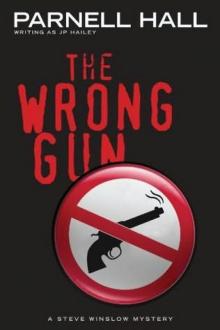 The Wrong Gun sw-5
The Wrong Gun sw-5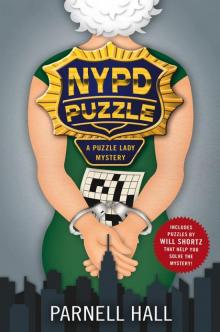 NYPD Puzzle
NYPD Puzzle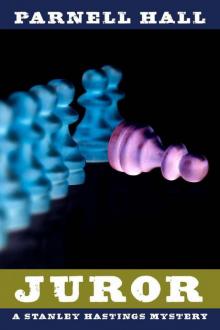 6 Juror
6 Juror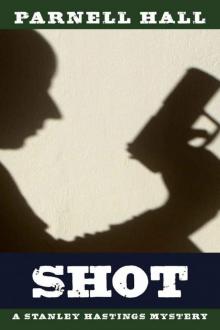 07-Shot
07-Shot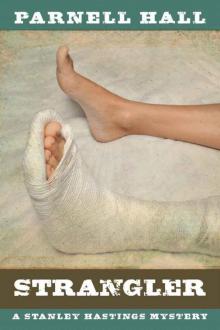 04-Strangler
04-Strangler 02-Murder
02-Murder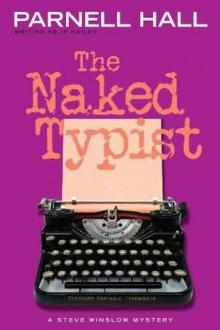 SW04 - The Naked Typist
SW04 - The Naked Typist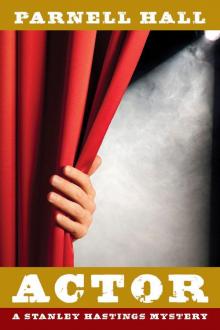 Actor
Actor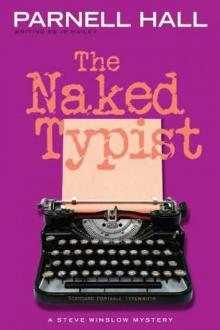 The Naked Typist sw-4
The Naked Typist sw-4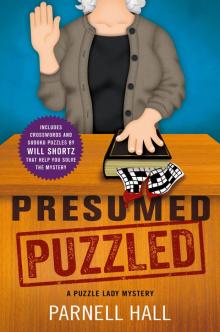 Presumed Puzzled
Presumed Puzzled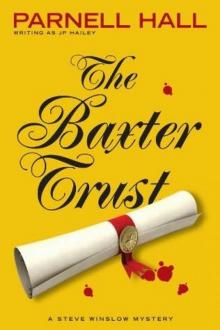 SW01 - The Baxter Trust
SW01 - The Baxter Trust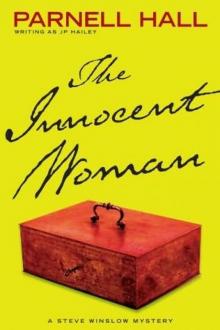 SW06 - The Innocent Woman
SW06 - The Innocent Woman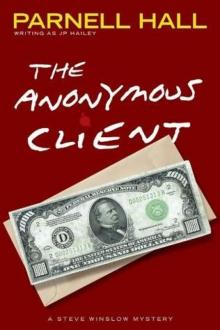 SW02 - The Anonymous Client
SW02 - The Anonymous Client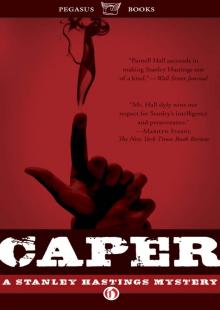 Caper
Caper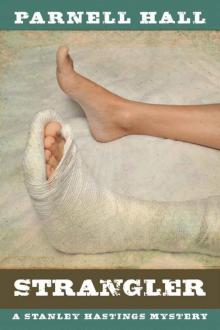 4 Strangler
4 Strangler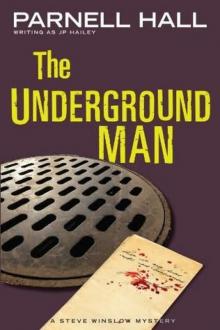 The Underground Man sw-3
The Underground Man sw-3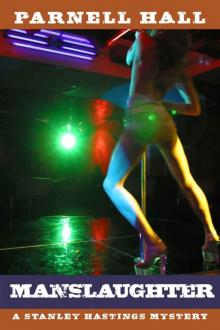 Manslaughter (Stanley Hastings Mystery, #15)
Manslaughter (Stanley Hastings Mystery, #15)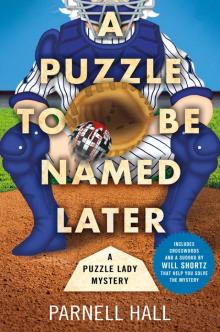 A Puzzle to Be Named Later--A Puzzle Lady Mystery
A Puzzle to Be Named Later--A Puzzle Lady Mystery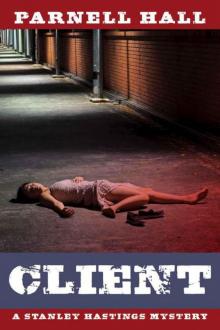 05-Client
05-Client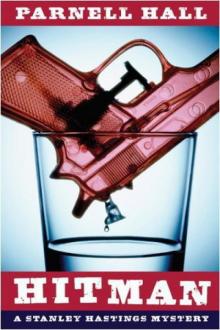 16 Hitman
16 Hitman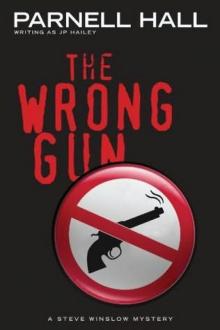 SW05 - The Wrong Gun
SW05 - The Wrong Gun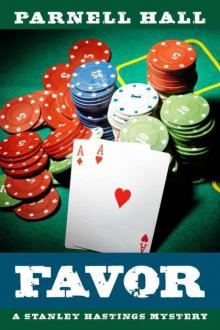 3 Favor
3 Favor Last Puzzle & Testament
Last Puzzle & Testament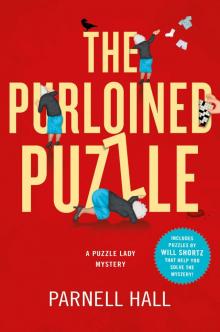 The Purloined Puzzle
The Purloined Puzzle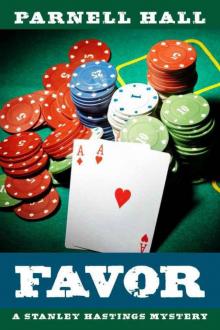 03-Favor
03-Favor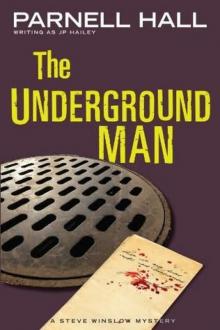 SW03 -The Underground Man
SW03 -The Underground Man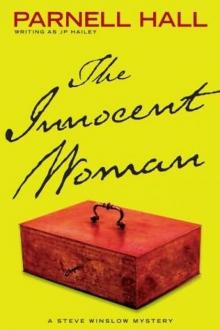 The Innocent Woman sw-6
The Innocent Woman sw-6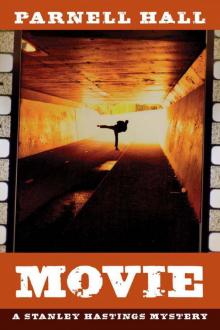 10 Movie
10 Movie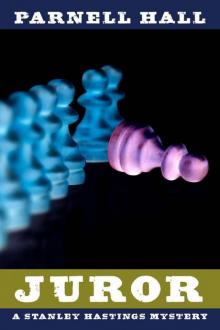 06-Juror
06-Juror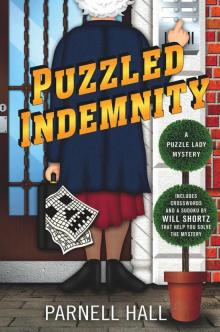 Puzzled Indemnity
Puzzled Indemnity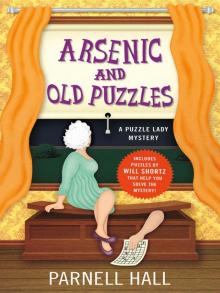 Arsenic and Old Puzzles
Arsenic and Old Puzzles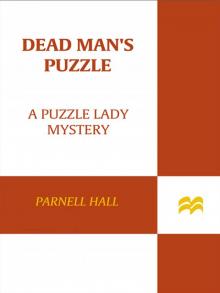 Dead Man's Puzzle
Dead Man's Puzzle Safari
Safari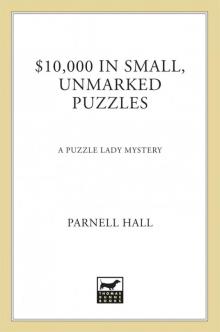 $10,000 in Small, Unmarked Puzzles
$10,000 in Small, Unmarked Puzzles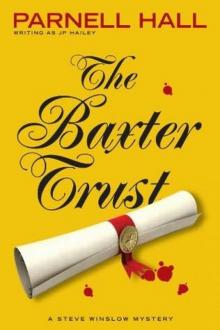 The Baxter Trust sw-1
The Baxter Trust sw-1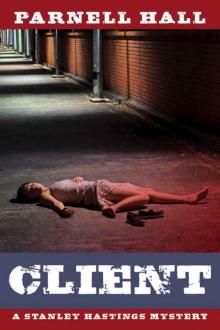 5 Client
5 Client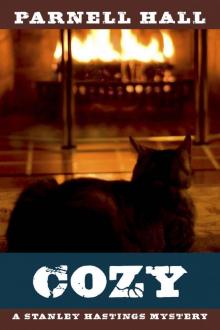 Cozy (Stanley Hastings Mystery, #14)
Cozy (Stanley Hastings Mystery, #14)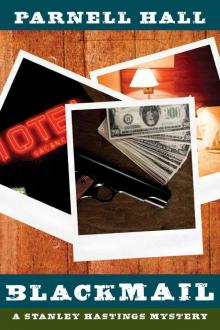 Blackmail
Blackmail A Puzzle in a Pear Tree
A Puzzle in a Pear Tree A Clue for the Puzzle Lady
A Clue for the Puzzle Lady Clicker Training (Stanley Hastings Mystery, A Short Story)
Clicker Training (Stanley Hastings Mystery, A Short Story)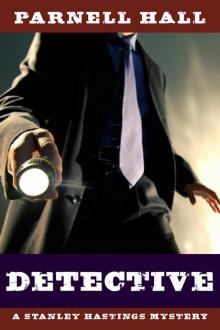 Detective (Stanley Hastings Mystery Book 1)
Detective (Stanley Hastings Mystery Book 1) 13 Suspense
13 Suspense